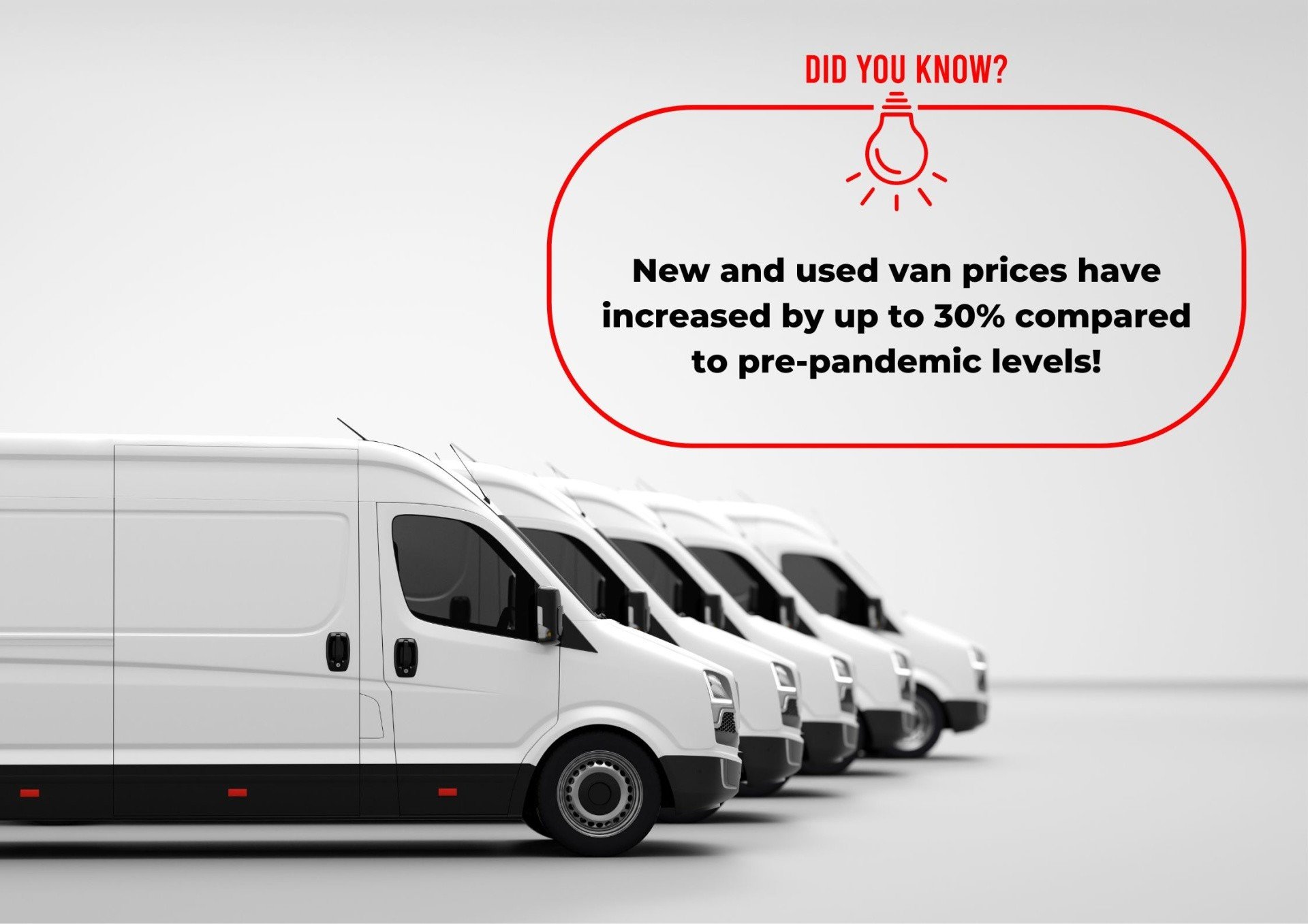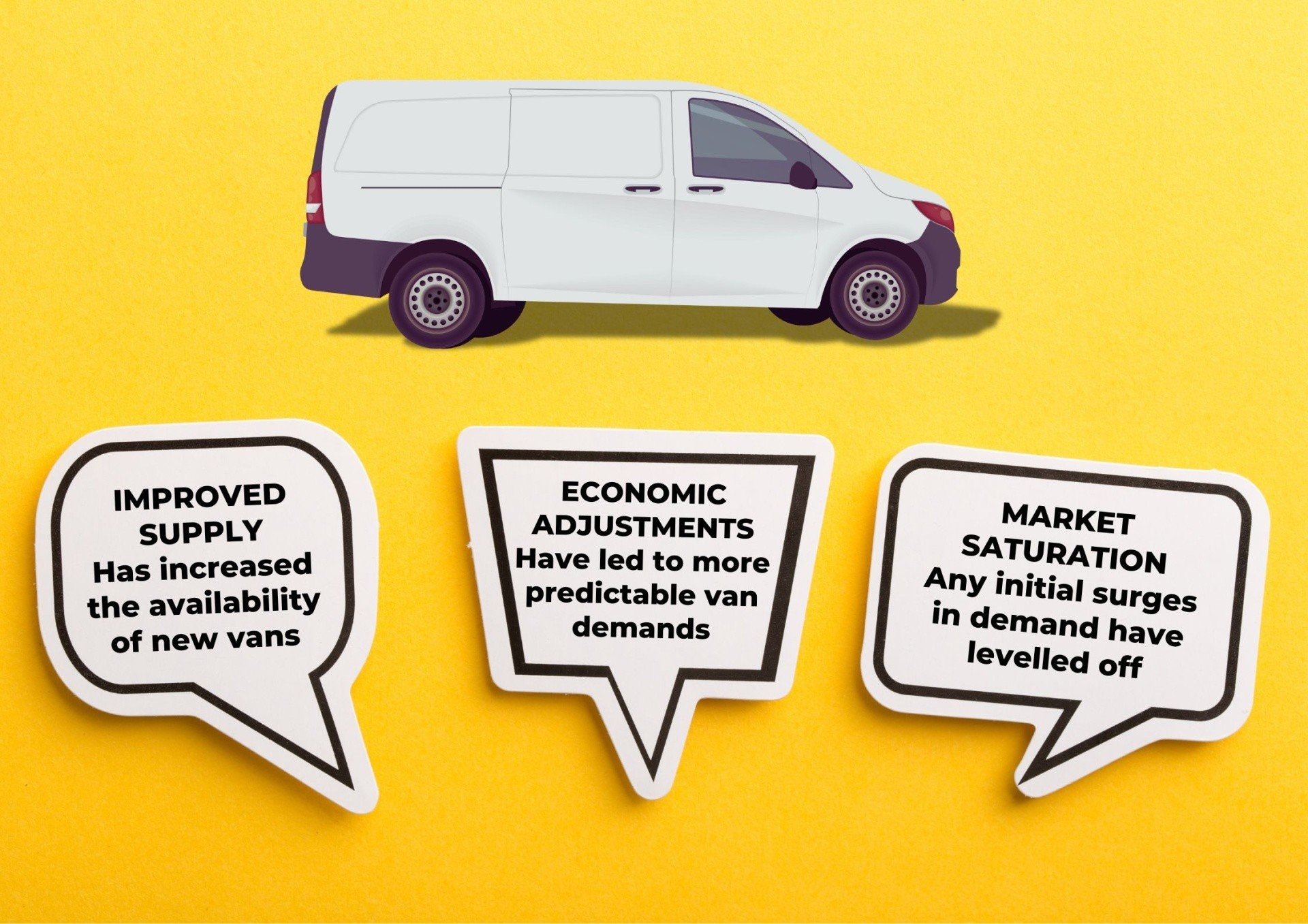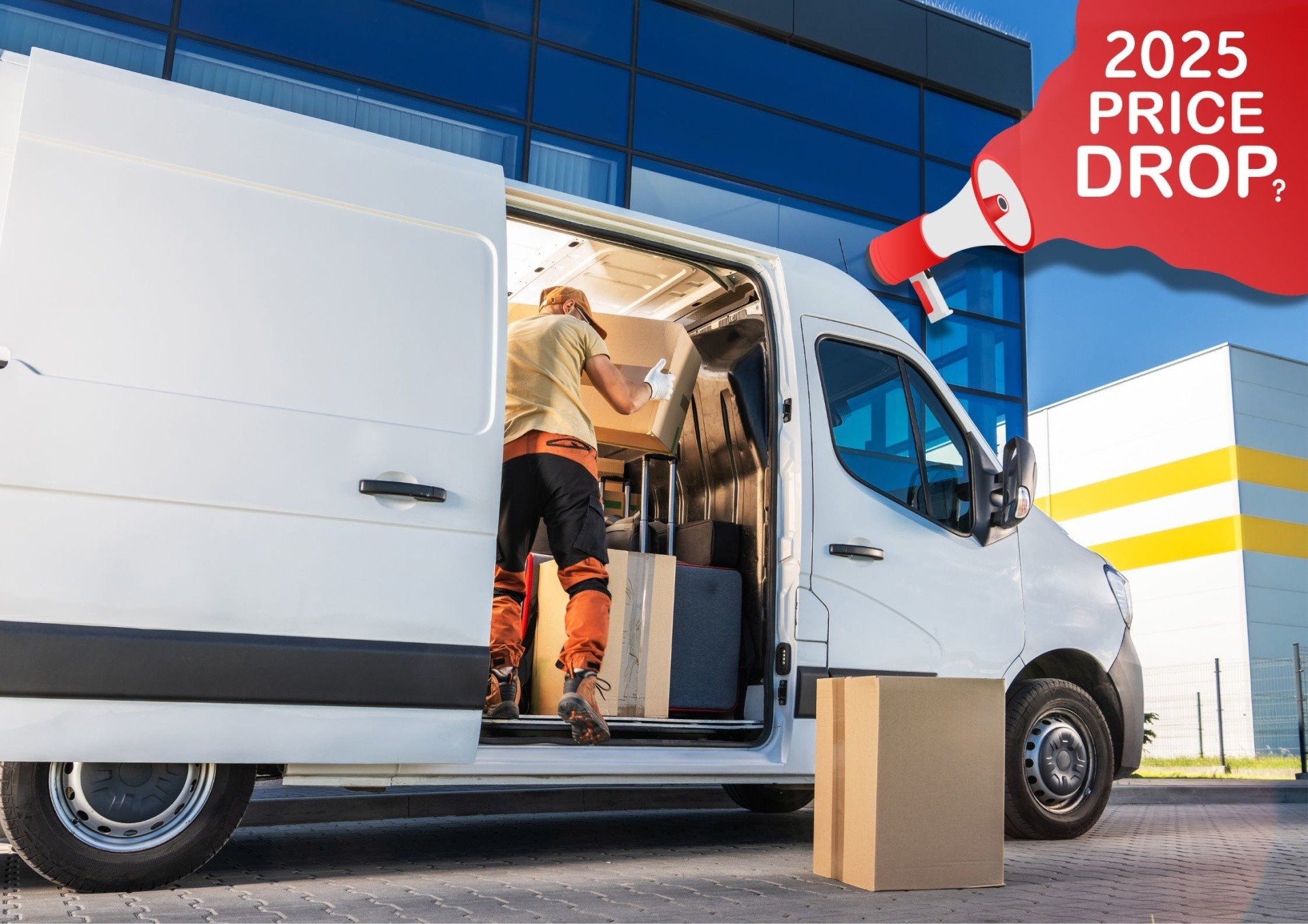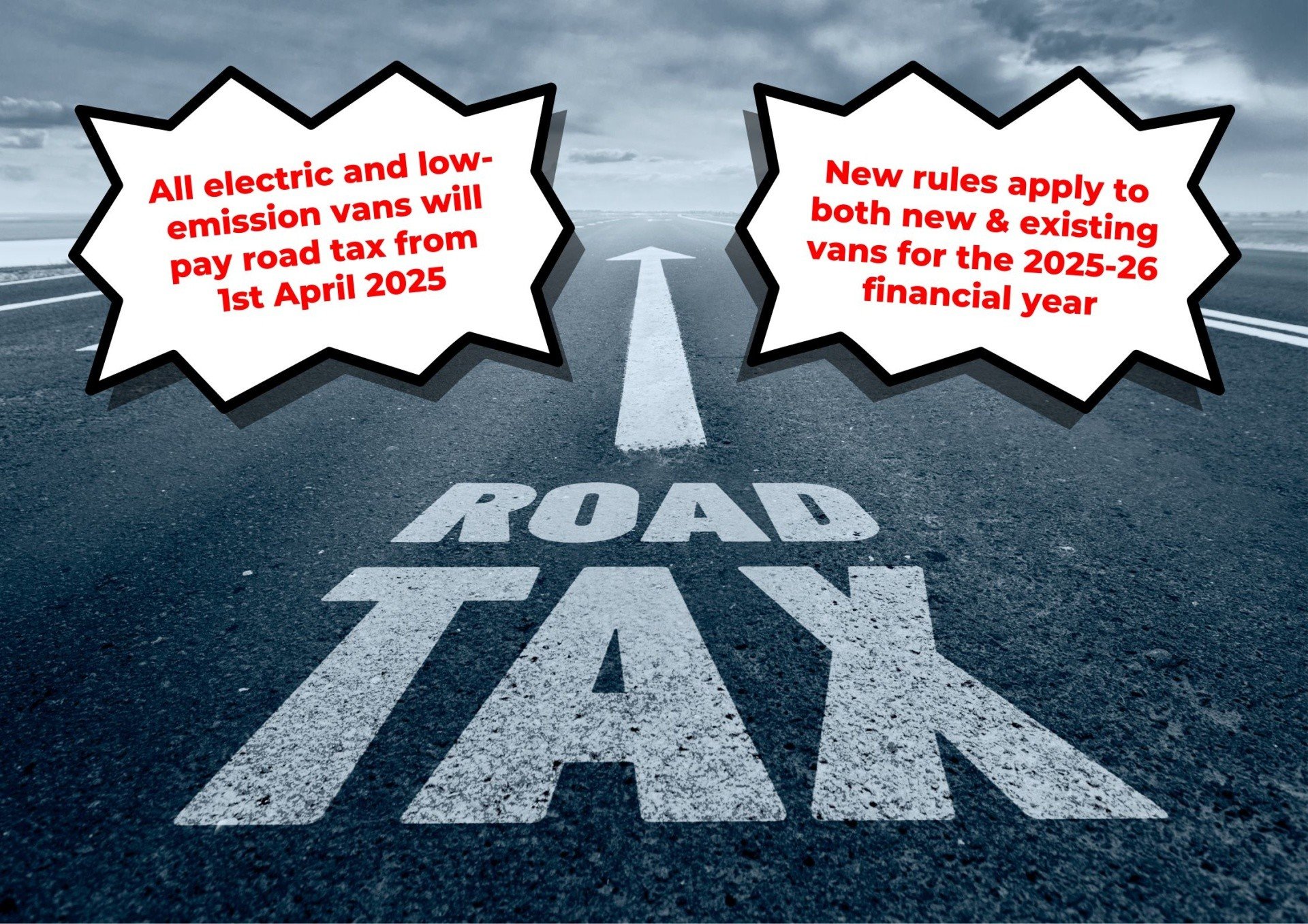Are Van Prices Dropping in 2025?
2025 Predictions: We discuss what will happen to the commercial vehicle market
If you've been eyeing that shiny new (or not-so-new) van but found yourself clutching your wallet in fear of not being able to afford it, you're not alone. In recent years, the van market has experienced significant fluctuations, leaving many potential buyers and industry observers wondering about the future of van prices.
This article delves into the current state of the UK van market and explores predictions for 2025. As such, we’ll be asking the key question we keep getting asked; “Are van prices dropping in 2025?” and looking into our crystal ball to give you the answer.
We'll discuss whether vans have recently increased in value, if prices are currently declining, and what to expect for the commercial vehicle market in the coming year or so. Read on to find out more…
Key Takeaways
- Van prices have been on a wild ride, with increases of 20-30% or more since the pandemic started.
- In 2024, van prices have stabilised and in some cases, have even taken a slight dip.
- For 2025, there are hints of potential price drops, but don't expect any dramatic plunges.
- Factors that could influence 2025 prices include increased van production, economic conditions, and the rise of electric/hybrid models.
- The UK is introducing Vehicle Excise Duty (VED) on electric and low emission vans from April 1, 2025, which could impact the market.
- Deciding whether to buy now or wait depends on your immediate needs and financial situation.
- Keep an eye on both new and used van markets – changes in one can affect the other.
- Electric van running costs will increase with the new VED, potentially affecting their appeal and prices.
- Always consider the total cost of ownership, not just the sale price, when van shopping.
Have vans gone up in value?
In the past few years, we've seen van prices shoot up faster than a rocket powered by energy drinks. The main reason for this is due to the pandemic-induced supply chain chaos. This led to a surge in home delivery solutions and businesses holding onto their trusty old vans hoping for prices to go down…

Supply Chain Disruptions:
The COVID-19 pandemic caused significant delays in manufacturing and shipping, leading to a worldwide shortage of new vans. As such, the commercial vehicles being shipped to the UK came with a premium price tag.
Increased Demand:
With the rise of e-commerce and home deliveries, there has been a surge in demand for commercial vans being ordered online and driven to your front door - convenience is key!
Economic Uncertainty:
Many businesses opted to maintain their existing fleets rather than invest in new vehicles, increasing the value of used vans. It’s all about supply and demand and without new vans being available, business owners looked to the used van market instead.
As a result, both new and used vans have been fetching astronomical prices - we're talking about increases of 20-30% or more compared to pre-pandemic levels!
Are van prices coming down?
While van prices haven't returned to pre-pandemic levels, the rate of increase has now slowed, and some segments of the market are seeing modest price reductions.
As of 2024, there are sure signs that van prices are beginning to stabilise and, in some cases, decrease slightly. Like elves before Christmas, manufacturers have been working overtime to catch up with demand which is one of the key factors contributing to the price drops…

Improved Supply:
Manufacturers have started to catch up with demand, increasing the availability of new vans being shipped into the UK.
Economic Adjustments:
Businesses and consumers are adapting to the post-pandemic economy, leading to more predictable demand patterns.
Market Saturation:
The initial surge in demand for commercial vehicles that can be ordered online and delivered has begun to level off.
Will used van prices drop in 2025?
Predicting market trends is always challenging but we appreciate you’re keen to know if used van prices will drop in 2025. Well, the good news is that there are a few signs pointing to a potential easing of prices in 2025…

Firstly, manufacturers are ramping up production like there's no tomorrow, which means more shiny new vans hitting the streets of Great Britain. This could take some pressure off the used van market and as a result, potentially reduce demand - and prices.
Secondly, a change in the UK Government from Conservative to Labour domination means our economy is making its best impression of a yo-yo. This means interest rates might stabilise or even drop, making finance opportunities for new vans more attractive.
And let's not forget about all those futuristic electric and hybrid vans zooming in from the future – they might just make some of the older fuel guzzlers less appealing to motorists.
However, it's important to note that any price drops are likely to be gradual rather than dramatic, and certain popular models or well-maintained vans may retain their value better than others - watch this space!
We have our fingers on the pulse in terms of vans news, so it's important for us to let you know that many of the leading manufacturers will be increasing all their prices on LCV’s from the 1st October 2024.
Therefore, if you can secure a great deal today on a van that is right for you and your business, it may be wise to proceed now. With price increases on new vans imminent, it may mean that the perfect deal you have found on your van could go up in price!
Is now a good time to buy a used van?
Deciding whether to purchase a used van now or wait until 2025 really does depend on your personal circumstances.

If you've found a van that ticks all your boxes and won't require you to sell a kidney, it might be worth grabbing it now. Plus, who knows what other curveballs the world might throw at us by 2025?
On the flip side, if you've got the patience of a saint and are feeling confident that van prices will definitely drop, waiting until 2025 might save you some cash. Below we weigh up the argument of whether to wait or buy now:
Reasons to buy now:
- You have an immediate need for a van
- You've found a well-maintained vehicle at a fair price
- You're concerned about potential future supply issues
- New LCV list prices are now increasing from the 1st October 2024, therefore existing van prices are likely to rise.
Reasons to wait:
- You're hoping for lower prices in 2025
- You're interested in newer technologies that may become more widely available
- You have flexibility in your timeline and can afford to monitor the market
Ultimately, the best time to buy is when you find a van that meets your needs and budget. If you decide to purchase now, focus on vehicles with good maintenance records and consider factors like fuel efficiency and potential resale value.
Changes to UK road tax in 2025 and its impact on van prices
From April 1, 2025, the UK will introduce Vehicle Excise Duty (VED) on electric and low-emission vans (and no, it's not an April Fool's joke!). This new tax will align with the rates currently applied to petrol and diesel vehicles.
The change applies to both new and existing vehicles, so even if you've already got an electric van, you'll need to start budgeting for this come the annual renewal date for the 2025-26 financial year.

So what does this mean for van prices? Well, it could throw a spanner in the works. The cost of running an electric van will go up, which might make some people think twice about going green.
This could lead to some interesting shifts in the market – maybe a comeback for super-efficient diesel vans? Or perhaps we'll see some price juggling from manufacturers to keep electric vans attractive.
Whatever happens, one thing is for sure that there are many pros to driving an electric van too!
Considerations for van buyers
If you're considering buying a van, especially an electric or low emission model, keep these points in mind:
- Factor in the upcoming VED costs when calculating the total cost of ownership.
- Consider the timing of your purchase – buying before April 2025 could save on tax in the short term.
- Keep an eye on potential new incentives or changes in van pricing that might emerge in response to this tax change.
- Reassess the comparative costs of electric, hybrid, and traditional fuel vans in light of these new taxes.
While these changes to UK road tax may impact the van market somewhat, they're unlikely to cause dramatic shifts in overall van prices. The total cost of ownership, including factors like fuel efficiency and maintenance costs, will remain important considerations when choosing between electric, hybrid, and conventional fuel vans.
As always, it's crucial to assess your specific needs and calculate the long-term costs and benefits when deciding on a van purchase. The team here at Loads of Vans can provide up-to-date information and help you navigate these changes to find the best van for your needs and budget.
Conclusion
At the end of the day, predicting van prices is about as easy as herding cats. While there are signs pointing to a potential ease in prices come 2025, nothing's set in stone. One thing's for sure though, all of our vans are 'priced to sell' so you can be sure of a good deal with us.
Remember, the right time to buy a van is when you find one that meets your needs and doesn't require you to remortgage your house. Whether you decide to purchase a commercial vehicle now or in the future, we are here to help.
At Loads of Vans, we offer some of the most competitively priced new and used vans in the UK; we're always happy to chat, whether you're ready to buy or just want to window shop. So why not swing by and see what all the fuss is about? Who knows, you might just drive away with the van of your dreams!
FAQs and Answers
We hope our article about van prices dropping in 2025 has provided you with some insight into what to expect in the coming year. Below, we answer some of your most asked questions relating to van prices and long-term vehicle ownership:
Is it a good idea to buy a van?
Buying a van outright can be a good idea depending on your specific needs and circumstances. To help make your decision, we recommend to consider if you require a vehicle for transporting goods or equipment, as a van can be essential.
Think about personal use too, as a van can be ideal if you enjoy camping or need extra space for hobbies. Always compare the costs of buying and maintaining a van against alternatives like renting or financing.
Do vans hold their value?
Vans generally hold their value quite well, especially compared to many passenger cars. Factors influencing a van's value retention include the make and model (as some brands are better known for their reliability), the overall condition, the mileage (the lower the better), and market demand.
However, like all vehicles, vans do depreciate over time. The rate of depreciation can vary based on market conditions and individual vehicle characteristics.
When should you get rid of a van?
You should consider replacing your van when:
- Repair costs consistently exceed the van's value or a new van payment.
- It no longer meets your needs in terms of size, features, or efficiency.
- You're experiencing frequent breakdowns affecting day-to-day operations.
- The van has high mileage (typically over 150,000-200,000 miles) and is showing signs of major mechanical issues.
Always weigh the costs of repairs against the potential benefits of a new, more reliable vehicle.
What's the future for diesel vans?
The future of diesel vans is in question due to environmental concerns and changing emission regulations. Many cities across the UK are implementing or planning low-emission zones, which may restrict diesel van access to these areas. Manufacturers are investing heavily in electric van technology, which may gradually replace diesel variants - especially in urban locations.
In the short term, some manufacturers are developing hybrid diesel-electric vans as a transitional option, but for long-haul logistics, diesel vans are still the vehicle of choice for many. While diesel vans are likely to remain relevant in the medium term, especially for long-distance transport, their dominance is expected to decline as alternative technologies improve and become more widespread.
What mileage is too high for a van?
The definition of "high mileage" for a van can vary, but generally:
- 100,000-150,000 miles is considered moderate to high mileage.
- 150,000-200,000 miles is considered high mileage and may require more frequent repairs.
- Over 200,000 miles is considered very high mileage which could indicate significant wear and tear.
However, mileage alone doesn't tell the whole story. A well-maintained van with higher mileage may be more reliable than a neglected van with lower mileage. When purchasing a used van, consider its maintenance history, type of use (highway vs. city driving), brand reputation for longevity, and your intended use and tolerance for potential repairs.
What is the average life of a van?
The average life of a van can vary significantly based on several factors, such as make and model, maintenance, and usage patterns. On average, with proper maintenance, many vans can last 10-15 years or 150,000-300,000 miles for well-maintained commercial vehicles.
Of course, vans can potentially last longer for personal use when they aren't subjected to heavy loads or constant use. Be aware that some vans may exceed these averages, while others might have shorter lifespans. Regular maintenance and addressing issues promptly are the key to maximising a van's lifespan.
How often should a van be serviced?
Regular servicing is crucial for maintaining a van's performance and longevity. First and foremost, oil changes should typically happen every 3,000-7,500 miles or as recommended by the manufacturer. A full service is usually annually or every 12,000 miles, whichever comes first. An interim service is often recommended every 6 months or 6,000 miles for vans under heavy use.
Are electric vans a good investment?
Electric vans are becoming an increasingly viable option for many. Whether an electric van is a good investment depends on your specific uses, local infrastructure, and available incentives. For urban deliveries and predictable routes, electric vans can be an excellent choice. For long-haul transport, diesel or hybrid options might still be more practical in the short term.
Here we lay out the pros and cons of each:
Pros -
- Lower running costs
- Reduced environmental impact
- Potential tax incentives and exemptions from emission zone charges
- Lower maintenance requirements
- Incredible current deals available with many enjoying a 50% discount
- Easier, quieter and more pleasant to drive
Cons -
- Higher upfront costs
- Limited range compared to diesel vans
- Longer refuelling (charging) times
- Potential battery replacement costs in the long term
CLICK HERE FOR OUR ELECTRIC VAN RANGE.
Find your perfect van at Loads of Vans
While the van market continues to evolve, one thing remains constant: the need for reliable, cost-effective vehicles for both business and personal use. At Loads of Vans, we're committed to meeting that need with our extensive selection of new and used vans at some of the most competitive prices in the UK.
Why choose Loads of Vans?
We offer a wide range of vans to suit every need and budget, from compact city vans to spacious long-wheelbase models - and everything in between! Our commitment to providing the best value means you'll find some of the lowest van prices in the UK, whether you're looking for a new or used vehicle.
All our used vans undergo thorough inspections and reconditioning to ensure they meet our high standards of quality and reliability. Our knowledgeable team can help you find the perfect van for your specific requirements, taking into account factors like payload, fuel efficiency, and running costs.
We also offer a variety of financing solutions to make your van purchase as affordable and straightforward as possible and rest assured that our commitment to you doesn't end with your purchase; we provide excellent after-sales service to keep your van running smoothly for years to come.
Whether you're in the market for a new van or looking for a quality used vehicle, Loads of Vans has you covered. Our extensive selection includes popular makes and models from trusted manufacturers, ensuring you'll find the right van to meet your needs and budget.
CLICK HERE TO VIEW OUR VANS, READY AND WAITING TO DRIVE AWAY TODAY!


